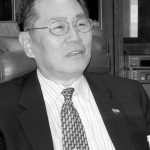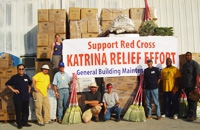
On December 7, 2007, an oil tanker collided with a barge in the Yellow Sea of South Korea, causing oil to spill and contaminating South Korea’s west coast. This accident severely affected the fishermen who make their living there, as well as the area’s ecosystem.
Oil Spill in the Gulf of Mexico: Whose Issue Is It?
05/01/2010
12:00 am
On December 7, 2007, an oil tanker collided with a barge in the Yellow Sea of South Korea, causing oil to spill and contaminating South Korea’s west coast. This accident severely affected the fishermen who make their living there, as well as the area’s ecosystem.
The Korean American community was shocked to the news, began raising money to help Korean victims. The Korean Americans in New York raised relief funds and collected $12,450. The Korean Americans in Southern California area made a visit to the damaged area in Korea and worked hands-on to strip oil off the coast and delivered relief funds totaling $20,000. Korean Americans from most of major U. S. cities voluntarily set up temporary fund-raising task forces. Korean Americans felt personally affected by this oil spill in Korea.
On April 20, 2010, an oil rig exploded in the Gulf of Mexico; oil has been spilling out continuously ever since—200,000 gallons a day from the bottom of the sea, spreading out and contaminating the Gulf of Mexico. Nearby states declared states of emergency as spilled oil approached the coast of each state. More than 2,000 officials from 16 federal agencies, 5,000 National Guardsmen, airplanes and 300 ships have worked together to try to keep the oil from spreading. The Washington Post reported on May 2 that the shrimp caught in the gulf already smell of diesel.
Both Korea and the United States experienced oil spill disasters. The difference is where they happened. This time, the disaster occurred in the United States, where we and our children live—not in Korea, where we used to live.
Reportedly, this disaster will disrupt a significant source of fish, and the beaches of the Gulf of Mexico could end up covered in black oil. Reuters reported that the cost of the damage is expected to reach $14 billion. The damages to the fishery and hospitality industries are enormous.
News of this oil spill makes me want to ask my fellow Korean Americans—those who intend to make the U.S. their permanent residence—the following question: “Does this oil spill in the Gulf of Mexico trouble you as much as the one did in Korea a few years ago?”
If your honest answer is, “No, it doesn’t,” I’d like to ask, “Why not?”
The answer is probably that you see the Gulf of Mexico oil spill as someone else’s issue, but the oil spill off South Korea is your issue.
Generally speaking, for Korean Americans, news from Korea hits them in their hearts, but U.S. news only hits them in their eyes and ears. As long as Korean Americans continue to feel that the problems of the U.S. are someone else’s problems, we should expect the same treatment if tragedy befalls us. If a disaster happens in a Korean American community, why should we expect mainstream American to care if we don’t exhibit the same care about what happens in mainstream America? This is a potential disaster for Korean Americans. We are planting our roots and the roots for our children in this country. We need to act and react accordingly.
When we begin to feel America’s pain along with other Americans, then we’re laying the foundation for proper relations within U.S. society. Without a foundation, we can’t expect to build walls and a roof either.
Am I naïve to expect that Korean Americans should have at least the same feelings and react with at least the same desire to help those around the Gulf of Mexico as they did when the oil spill happened in Korea?
On December 7, 2007, an oil tanker collided with a barge in the Yellow Sea of South Korea, causing oil to spill and contaminating South Korea’s west coast. This accident severely affected the fishermen who make their living there, as well as the area’s ecosystem.
Sunny Park, Director General, Good Neighboring Foundation
Easy to Search
News Articles
GBM cleans up in building maintenance – Minority-owned firm sweeps to $22 million
The president of one of Atlanta’s fastest-growing janitorial and facility maintenance companies hopes...
Korean-Americans Raise Money for the Killers of Two Korean Kids
US Army Sgt. Fernando Nino and Sgt. Mark Walker were cleared of any wrong-doing by a US Army military...
Awards create foreign possibilities
The idea of studying abroad for an entire semester might be daunting for students, considering the time...
Most Influential Atlantans 2005
Charles Bannister: Gwinnett County Board of Commissioners Chairman Charles Bannister, 66, ousted longtime...
Hard Work, Determination, and Generosity Steer An Immigrant To Success
Arriving in the United States penniless and speaking broken English didn’t deter Sunny K. Park from pursuing...
Park receives highest DAR honor
The Fort Peachtree Chapter of the Daughters of the American Revolution presented Dunwoody resident Sunny...
48th Brigade Combat Team passes flag to Sunny Park
48th Brigade Combat Team passes flag to Sunny Park. 48th Brigade Combat Team passes flag to Sunny Park...
Sunny K. Park Earns Lifetime Achievement Honor For Youth Challenge Support, Encouragement
Atlanta businessman and Youth Challenge advocate Sunny K. Park was presented the National Guard Youth...
‘Good Neighboring Day’ ’07 brings Korean culture to Fort Gordon YCA cadets
“If Sunny can, I can,” was the theme of the morning lectures that Sunny Park, founder of the Good Neighboring...
Work hard, give back Park tells Rotarians
Immigrants might find coming to America easier if they followed the Sunny Park model. The native of South...
speeches
I’m not sure I deserve to be inducted into the Atlanta Business Hall of Fame. Maybe the selection committee...
No posts found
Initiatives
No posts found


